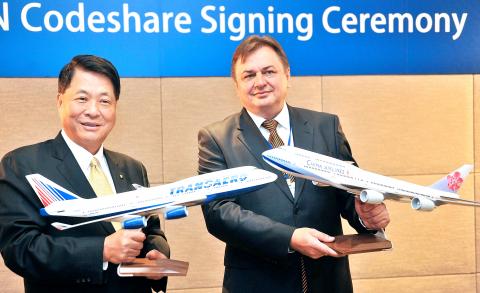The nation’s three listed airlines yesterday saw their share prices close down by more than 2 percent — compared with the benchmark index’s 0.02 percent drop — after the government on Wednesday confirmed the nation’s first case of H7N9 avian influenza.
China Airlines Ltd (CAL, 中華航空) shares fell 2.2 percent to close at NT$11.1, while those of EVA Airways Corp (EVA, 長榮航空) and TransAsia Airways Corp (TNA, 復興航空) declined 2.37 percent and 2.18 percent respectively to close at NT$16.5 and NT$13.45, Taiwan Stock Exchange data showed.
Shares of other tourism-related stocks also dropped in the session owing to fears of reduced interest in leisure and travel, while those related to influenza treatment and prevention rose on expectation of a better sales outlook.

Photo: Yao Chieh-hsiu, Taipei Times
CAL, the nation’s largest carrier, said it expects limited impact from the avian flu issue, while pinning its hopes on declining global crude oil prices boosting its profitability this quarter.
“This is definitely not like the SARS outbreak [in 2003] … as the situation in China has been gradually brought under control,” CAL chairman Sun Hung-hsiang (孫洪祥) told reporters after the company signed a code-sharing agreement with Transaero Airlines of Russia yesterday.
Sun said he has not seen the order cancellation rate in the passenger sector show a significant rise, with passenger load of cross-strait routes staying at an average of 80 percent this month.
“The H7N9 issue has had some impact on the company’s business, but not a big one so far,” Sun said.
However, the recent decline in global crude oil prices may generate some positive impact on the carrier this quarter, he added.
Prices of global jet fuel dropped to US$111 per barrel this month, from NT$130 in the January-to-February period, which is an indication that cost pressures for airlines have been easing, Sun said.
In addition, CAL aims to boost its sales in the second quarter by launching a code-sharing service with Transaero Airlines on the route between Taipei and Moscow via Bangkok that will begin on Wednesday next week.
CAL will operate the flights between Taipei and Bangkok, while Transaero will handle the Bangkok and Moscow route.
The carriers will run the route with two flights per week, but the frequency may be varied between two and seven flights per week due to seasonal adjustments, CAL said.
Dmitry Stolyarov, a deputy general director at Transaero, said the passenger load of the carrier’s route between Bangkok and Moscow averaged more than 80 percent last year.
The company expects to cooperate with CAL on other routes in the future, following Transaero’s plan to launch a route between Moscow and Hong Kong in the third quarter, Stolyarov added.

Leading Taiwanese bicycle brands Giant Manufacturing Co (巨大機械) and Merida Industry Co (美利達工業) on Sunday said that they have adopted measures to mitigate the impact of the tariff policies of US President Donald Trump’s administration. The US announced at the beginning of this month that it would impose a 20 percent tariff on imported goods made in Taiwan, effective on Thursday last week. The tariff would be added to other pre-existing most-favored-nation duties and industry-specific trade remedy levy, which would bring the overall tariff on Taiwan-made bicycles to between 25.5 percent and 31 percent. However, Giant did not seem too perturbed by the

AI SERVER DEMAND: ‘Overall industry demand continues to outpace supply and we are expanding capacity to meet it,’ the company’s chief executive officer said Hon Hai Precision Industry Co (鴻海精密) yesterday reported that net profit last quarter rose 27 percent from the same quarter last year on the back of demand for cloud services and high-performance computing products. Net profit surged to NT$44.36 billion (US$1.48 billion) from NT$35.04 billion a year earlier. On a quarterly basis, net profit grew 5 percent from NT$42.1 billion. Earnings per share expanded to NT$3.19 from NT$2.53 a year earlier and NT$3.03 in the first quarter. However, a sharp appreciation of the New Taiwan dollar since early May has weighed on the company’s performance, Hon Hai chief financial officer David Huang (黃德才)

NVIDIA FACTOR: Shipments of AI servers powered by GB300 chips would undergo pilot runs this quarter, with small shipments possibly starting next quarter, it said Quanta Computer Inc (廣達), which supplies artificial intelligence (AI) servers powered by Nvidia Corp chips, yesterday said that AI servers are on track to account for 70 percent of its total server revenue this year, thanks to improved yield rates and a better learning curve for Nvidia’s GB300 chip-based servers. AI servers accounted for more than 60 percent of its total server revenue in the first half of this year, Quanta chief financial officer Elton Yang (楊俊烈) told an online conference. The company’s latest production learning curve of the AI servers powered by Nvidia’s GB200 chips has improved after overcoming key component

UNPRECEDENTED DEAL: The arrangement which also includes AMD risks invalidating the national security rationale for US export controls, an expert said Nvidia Corp and Advanced Micro Devices Inc (AMD) have agreed to pay 15 percent of their revenue from Chinese artificial intelligence (AI) chip sales to the US government in a deal to secure export licenses, an unusual arrangement that might unnerve both US companies and Beijing. Nvidia plans to share 15 percent of the revenue from sales of its H20 AI accelerator in China, a person familiar with the matter said. AMD is to deliver the same share from MI308 revenue, the person added, asking for anonymity to discuss internal deliberations. The arrangement reflects US President Donald Trump’s consistent effort to engineer